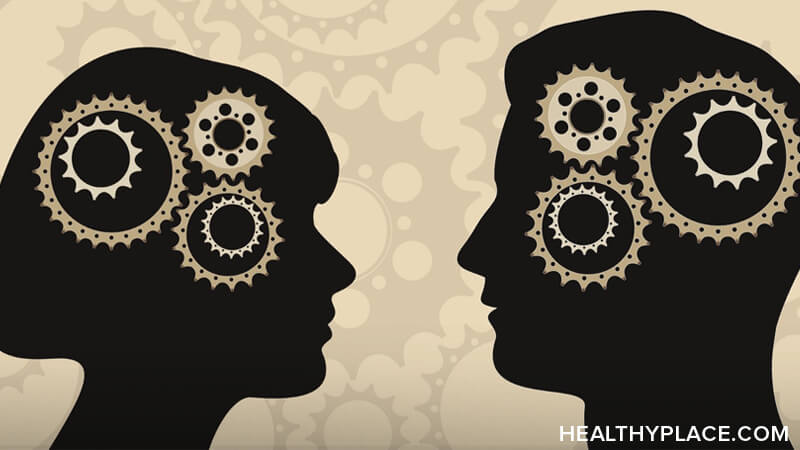Are Schizophrenia Symptoms in Males and Females Different?

Schizophrenia is a serious mental illness, experienced by both males and females, that involves a particular set of symptoms. The nature of the symptoms of schizophrenia is wide-ranging, involving positive and negative symptoms of schizophrenia, and symptoms involving cognitive and neurological deficits. Symptoms also involve general mental health-related features.
Professionals often conceptualize schizophrenia as a group of symptoms and features rather than one single illness. Given such wide-ranging features, it’s logical to wonder if schizophrenia symptoms are different for males and females.
To be diagnosed with schizophrenia, someone must fall within the diagnostic criteria listed in the DSM-5, the American Psychiatric Association’s Diagnostic and Statistical Manual of Mental Disorders, Fifth Edition. Both men and women must exhibit two or more of the following symptoms (note: together, the first four are considered positive symptoms):
- Delusions
- Hallucinations
- Disorganized speech
- Grossly disorganized or catatonic behavior
- Negative symptoms
At least one symptom must be delusions, hallucinations, or disorganized speech. Once a man or a woman meets this main criterion, he or she is diagnosed with schizophrenia. He or she may have any number of associated symptoms (Complete List of Schizophrenia Symptoms).
Men and women can be diagnosed with the same serious mental illness we call schizophrenia. Because schizophrenia has so many different symptoms and thus is considered to be a group of disorders, it is a highly individualized disorder. No one experiences schizophrenia the exact same way as someone else.
Even beyond the individual differences, however, schizophrenia can look and feel different for men and women. The schizophrenia symptoms are different in males and females; accordingly, schizophrenia can be a different experience for a man than it is for a woman.
Differences in Symptoms in Men and Women
To receive a diagnosis of schizophrenia, both men and women must have both positive and negative symptoms. Beyond this, the types of symptoms that men and women experience can be quite different.
Men’s symptoms tend to be more severe than women’s. Additionally, schizophrenia symptoms in males are typically characterized in this way:
- Negative symptoms more prominent than positive symptoms
- Cognitive impairments
- Social impairments
- Presence of obsessive-compulsive symptoms
- Disorganization (speech and behavior)
Women often experience schizophrenia differently than do men, and it can look different to observers, too. Schizophrenia symptoms in females often involve:
- Positive symptoms, especially hallucinations and delusions
- Affective (mood) symptoms, including depression
- Anxiety
- Fatigue
- Irritability
How Schizophrenia Symptom Differences Affect Quality of Life
Men and women can experience symptoms of schizophrenia that are quite different from each other. This difference can impact overall quality of life (Living with Schizophrenia: Effects of Schizophrenia). All symptoms of schizophrenia are very disruptive to everyone who lives with the illness. Schizophrenia isn’t easy for men or women. However, because of the differences in symptoms in males and females, the effects on quality of life are different.
Men tend to experience more problems than women. The schizophrenia symptoms in males can cause more maladaptive behavior such as substance abuse with schizophrenia, isolation, and anti-social behavior. They experience more personal troubles like relationship problems, family trouble, unemployment, and homelessness. Perhaps all of these struggles relate to the difficult cognitive problems schizophrenia creates such as lack of motivation and drive, problems with planning, decision-making, and completing tasks.
Women, in contrast, experience a better quality of life despite living with schizophrenia. Women are more likely to marry, have children, and maintain employment. The higher social functioning that women experience allows them to deal with schizophrenia differently.
Why the Difference in Schizophrenia Symptoms in Men and Women?
While researchers continue to study this important question, one thing is known: Males and females have different schizophrenia symptoms and experiences because of differences in the brain. Multiple areas within the brain have been implicated in schizophrenia (Schizophrenia Brain: Impact of Schizophrenia on the Brain).
The areas of damage—including, but not limited to, the inferior parietal lobe (IPL) in the cerebral cortex—that are associated with this mental illness are different in men and women. Schizophrenia damages male brains differently than female brains.
Men and women can have different symptoms of schizophrenia, and those symptoms affect lives uniquely. One isn’t “better” or “worse,” because schizophrenia is a mental illness that is challenging for everyone who lives with it. Also, while there is no cure for schizophrenia, people of both genders can work to minimize symptoms and live a quality life. When someone with schizophrenia is viewed as an individual with symptoms and strengths, the gender differences don’t seem as big.
APA Reference
Peterson, T.
(2021, December 28). Are Schizophrenia Symptoms in Males and Females Different?, HealthyPlace. Retrieved
on 2025, November 25 from https://www.healthyplace.com/thought-disorders/schizophrenia-symptoms/are-schizophrenia-symptoms-in-males-and-females-different



